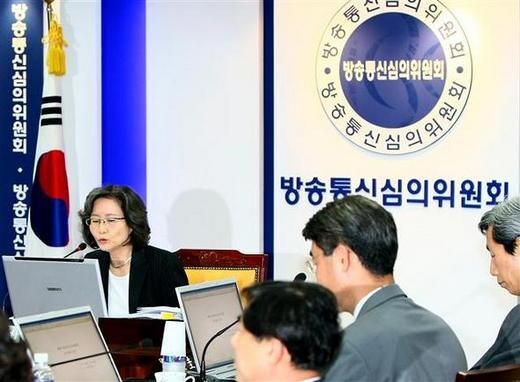hankyoreh
Links to other country sites 다른 나라 사이트 링크
Law experts say newspaper boycott ‘not illegal’

Legal experts who were asked for their advice by the Korea Communications Standards Commission were found to have said that a consumer boycott “cannot be viewed as illegal,” before the ruling was made. However, in spite of their advice, the KOCSC ruled, on July 1, that the campaign, launched by users of Daum Communications’ Internet debate forum Agora, was illegal. The campaign encourages people to boycott companies that advertise in the country’s three main conservative newspapers, the Chosun Ilbo, the JoongAng Ilbo and the DongA Ilbo.
In addition, some experts pointed out that an order from the KOCSC to delete information related to the boycott campaign failed to comply with the procedures as stipulated in a law governing information networks and protection of information.
According to a legal advisory on the KOCSC ruling, obtained by The Hankyoreh on July 3, a majority of experts, recommended by the Korea Criminal Law Association and others, said it would be inappropriate for the KOCSC to ask Internet companies to delete messages from the Web because the messages, against advertisers, cannot be viewed as an obstruction of business under the criminal law. In a general meeting on June 25, the KOCSC invited three legal experts from the Lawyers for a Democratic Society, the Korea Criminal Law Association and the Korea Bar Association to share their opinions on the issue.
A law expert with the civil group Lawyers for a Democratic Society said, “Obstruction of business is defined as an intention to disrupt work by spreading false rumors or using physical force. No physical force was used in the Internet campaign, so the part about disruption of work with false rumors is the only thing to be dealt with.”
Also, an expert from the Korea Criminal Law Association said, “It is difficult to view the posting of the name, telephone number and Web site address of an advertiser on the Internet as ‘physical force’ under the crime of obstruction of business.”
An expert from the Korean Bar Association said, “If the messages posted on the Internet were found to contain illegal information, posting messages could, by law, be ordered to be limited, rejected and stopped. To do so, however, there must be evidence of defamation, the spreading of fear or discomfort, and obstruction of business.”
In spite of the legal experts’ opinions, the KOCSC ruled on July 1 that the boycott campaign is illegal. In addition, the KOCSC classified all related messages as “illegal information” and asked Daum to delete them.
The KOCSC has refused to release the legal advisory, saying, “The experts don’t want to reveal their names and opinions and it wasn’t an official advisory.”
Some experts have pointed out that the KOCSC ruling fails to comply with an ordinance that is part of the Act on Promotion of Information and Communications Network Utilization and Information Protection. Under the ordinance, the KOCSC is required to make a “ruling of restriction after a procedure of review” when the head of a government agency asks to review a case. However, this was not the case with the KOCSC ruling. The KOCSC received no requests from government agencies asking to review the case before it made its ruling.
Please direct questions or comments to [englishhani@hani.co.kr]
Editorial・opinion
![[Column] Has Korea, too, crossed the Rubicon on China? [Column] Has Korea, too, crossed the Rubicon on China?](https://flexible.img.hani.co.kr/flexible/normal/500/300/imgdb/original/2024/0419/9317135153409185.jpg) [Column] Has Korea, too, crossed the Rubicon on China?
[Column] Has Korea, too, crossed the Rubicon on China?![[Correspondent’s column] In Japan’s alliance with US, echoes of its past alliances with UK [Correspondent’s column] In Japan’s alliance with US, echoes of its past alliances with UK](https://flexible.img.hani.co.kr/flexible/normal/500/300/imgdb/original/2024/0419/2317135166563519.jpg) [Correspondent’s column] In Japan’s alliance with US, echoes of its past alliances with UK
[Correspondent’s column] In Japan’s alliance with US, echoes of its past alliances with UK- [Editorial] Does Yoon think the Korean public is wrong?
- [Editorial] As it bolsters its alliance with US, Japan must be accountable for past
- [Guest essay] Amending the Constitution is Yoon’s key to leaving office in public’s good graces
- [Editorial] 10 years on, lessons of Sewol tragedy must never be forgotten
- [Column] A death blow to Korea’s prosecutor politics
- [Correspondent’s column] The US and the end of Japanese pacifism
- [Guest essay] How Korea turned its trainee doctors into monsters
- [Guest essay] As someone who helped forge Seoul-Moscow ties, their status today troubles me
Most viewed articles
- 1[Column] The clock is ticking for Korea’s first lady
- 2After 2 months of delayed, denied medical care, Koreans worry worst may be yet to come
- 3[Column] Has Korea, too, crossed the Rubicon on China?
- 4US overtakes China as Korea’s top export market, prompting trade sanction jitters
- 5[Editorial] When the choice is kids or career, Korea will never overcome birth rate woes
- 6[Correspondent’s column] In Japan’s alliance with US, echoes of its past alliances with UK
- 7[Photo] Smile ambassador, you’re on camera
- 8Hong Se-hwa, voice for tolerance whose memoir of exile touched a chord, dies at 76
- 9Nearly 1 in 5 N. Korean defectors say they regret coming to S. Korea
- 10Strong dollar isn’t all that’s pushing won exchange rate into to 1,400 range